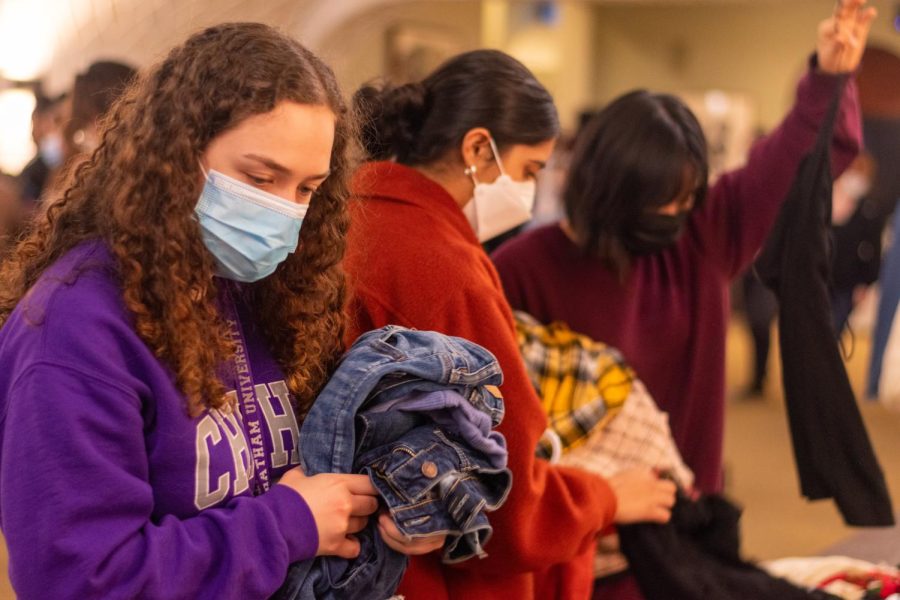College students need to stop supporting Shein and the fast fashion industry
Students browse at the Sustainable Fashion Fair in Mellon Board Room on March 25, 2022. Photo Credit: Lilly Kubit
January 30, 2023
It’s officially the cold season in Pittsburgh, which means making sure our closets are stocked with coats and sweaters. Shein, a popular fashion brand among Gen Z, has sweaters selling for as low as $11. You’re not the one paying the real price though.
Swiss advocacy group Public Eye found that Shein had Chinese employees working 75-hour weeks. Workers said on a good month, they made 10,000 yuan, approximately $1,500. The math works out to be about $5 per hour, and that’s on a good month. Exploiting workers is a part of how the fast fashion industry keeps profits high and prices low.
The environmental impact isn’t pretty either. According to the United Nations, 8 to 10% of global emissions are from the fashion industry. That’s more than the emissions from planes and shipping combined.
Creating new clothes requires an incredible amount of resources. The UK House of Commons’ Environmental Audit Committee found that a pair of jeans and a shirt could take up to 20,000 liters of water to make. The Guardian found that Shein produced 10,000 products a day in 2022, and only 6% stayed in stock for more than 90 days.
We’re using water and polluting the air for cheaper clothes.
This is a perfect example of the fast fashion industry at its strongest. Shein churns out a ridiculous amount of clothing at shockingly low prices that woo consumers into buying more and more items, and those clothing pieces are ending up in landfills.
In 2018, Americans produced around 17 million tons of textile waste. Two-thirds of that ended up in landfills, according to the Environmental Protection Agency.
Water and air in exchange for clothes we aren’t even keeping.
According to Vogue, in 2021 approximately 69% of people said that sustainability was important to them when purchasing clothing. If this is important to us, especially as students at a university that is dedicated to sustainability, then something has to change.
Buying into the fast fashion industry might be tempting because of the low prices, but there is a convenient alternative that doesn’t break the bank: thrifting. Thrifting is the cheapest alternative to the fast fashion industry because clothes can be resold and reused without supporting the company that made them. There’s a Goodwill on Centre Avenue that’s only a 20-minute walk from Chatham’s Shadyside Campus.
There are plenty of other opportunities, even on campus. Chatham Student Power is planning to hold its annual Sustainable Fashion Fair during the term, likely at the end of March, according to CSP Co-President Aidan Bobik ‘24. Students can donate clothes, books and other items to gain credit to purchase new ones. If students don’t have anything to donate, everything is $1.
If you prefer online shopping, ThredUp and Unclaimedbaggage.com have a wide collection of brands. The latter, as the name suggests, sells items found in unclaimed baggage, including luxury and designer brands.
Purchasing straight from local boutiques (Pittsburgh has plenty of second-hand boutiques with curated selections) and independent artists are another pair of great ways to support ethical fashion, although it is typically more expensive than thrifting.
But don’t shy away from spending money on staple clothing pieces. The higher quality of the material, the longer it’ll last. Underwear and everyday clothes might warrant a splurge. Do your research on brands and look for a fair trade certification.
Reducing purchases is another way to limit supporting fast fashion brands if you can’t spring for more expensive and ethical clothing. When making a purchase, ask yourself if it’s a necessity or a desire. If it’s a desire, consider saving your money and spending it elsewhere.
It may be difficult to live a life devoid of any fast fashion items, but that doesn’t mean we can’t strive to reduce and reuse. Ignoring the effects our consumption has on the Earth and the people on it is at best nihilistic hubris, and at worst, killing us.








